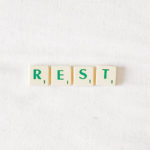
Church leaders have a difficult time with the idea of rest despite the fact God created a day especially for the purpose.
By Marty Duren
Work may be done for six days, but on the seventh day there must be a Sabbath of complete rest, holy to the Lord. Exodus 31:15a (CSB)
The purpose of this article is not to argue whether Saturday or Sunday constitutes a Sabbath in the New Testament era, but to consider the concept of rest. The Sabbath was instituted as a sign of the covenant between God and Israel (Exodus 31:15b-16) and was to be a day of complete rest, recalling the seventh day of creation (Exodus 20:8).
Often, though, pastors and other church leaders have a difficult time with the idea of rest despite the fact many of them work hours exceeding a standard workweek and though God created a day especially for the purpose.
A 2010 study from Lifeway Research found
the typical pastor works 50 hours a week. Scott McConnell, [executive director] of Lifeway Research, pointed out, however, that this average actually understates the number of hours because it takes into account bivocational pastors (11 percent of survey participants), part-time senior pastors (5 percent of survey participants), and volunteer pastors (2 percent of survey participants)—the majority of whom work, by design, less than 40 hours for their church each week.
“Since the phone survey went to church offices, it was pastors who were at the church office and more likely to take the phone call who are included in the survey,” McConnell explained. “But, of the bivocational pastors who participated, the median number of hours bivocational and part-time pastors work for their churches each week is 30 hours.”
Any way you look at it, pastors work a lot of hours each week. Bivocational pastors work 30-40 hours a week for their “regular job,” then many more in their ministry job. For many—full-time, part-time, volunteer, or bivocational—few days of complete rest are found. Saturdays are often filled with church activities while Sundays bring preaching, meetings, leading a small group, impromptu or scheduled counseling, and the list goes on.
How, then, do we over-worked, under-rested pastors change our habits to include genuine rest?
Start with small blocks of time.
Pick every Friday this month from 6 to 9 a.m. or next Sunday afternoon from when you get home until dinnertime, or 30 minutes after your final appointment today and block it out. Assign it on your calendar: REST. Then, when the time arrives, do just that: rest. No escapism. No self-medication. No errands. No trolling social-media feeds.
Start small, and move consistently and purposefully toward full days of rest.
Fight the guilt.
I am bivocational. I am full-time at Lifeway and part-time as Groups Pastor at my church. Yet, there is almost nothing in my personal life that brings more guilt than resting. Whether sitting in a chair reading a book for pleasure, laying on the couch watching a movie, or sitting on the back deck listening to the birds, I fight the guilt of “doing nothing.” Clearly this is false-guilt and not of God, but I feel it nonetheless.
But, I have purposed in my heart that I will fight the guilt until I am able to rest without it.
Accept the gift of God.
“Every good and perfect gift is from above,” writes James (1:17a). Rest is one of the gifts God insists on giving over and over. Rest is not only God’s command to do nothing; it is his permission to do nothing.
It’s oft been noted how frequently Jesus pulled away from the crowds—and even his disciples—to be by himself. Often he prayed, but without a doubt he rested. And, since we know he kept the Sabbath perfectly, he spent one day in seven resting. If Jesus received rest as a gift, how much more should we?
Block time for things that relax you.
My wife assures me that going bargain hunting at a thrift store or refinishing a piece of furniture relaxes her. It isn’t tiring, she tells me. I believe her because I feel the same way on the trail or driving the S-turns on a backroad somewhere.
Perhaps for you it is fishing, hunting, RC planes, kayaking, cooking, or spending time with your grandkids. Whatever that thing is that relaxes you, block that time and protect it.
Accept our need to sleep.
Early to bed and early to wise may or may not make one healthy, wealthy, and wise, but up late and up early is nearly guaranteed to be unhealthy. Recent studies suggest
parts of the human brain may well be asleep when it is sleep-deprived. Studies on whales and dolphins show that when asleep they continue to use half of their brain to swim and come up to the surface for air.
A study on human patients showed that something similar goes on in our brains. As they became more sleep-deprived, parts of their brain became inactive while they were still awake.
Our brains are active during sleep signaling our bodies to release hormones and compounds that help:
- decrease risk for health conditions
- manage your hunger levels
- maintain your immune system
- retain memory
- increase brain plasticity
And what is sleep if not daily rest?
I have never met a pastor who did not say, “I’m in it for the long haul.” If the long haul is the goal, then routine maintenance is a must. And, rest is a required element of maintenance, so do not ignore it.

Marty Duren
Marty is a freelance writer and editor in the Nashville, TN area. He also hosts the Uncommontary podcast.










